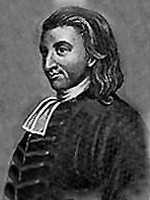Thomas Boston
| Reverend Thomas Boston | |
|---|---|
 | |
| Born |
17 March 1676 Duns, Berwickshire |
| Died |
20 May 1732 (aged 56) Duns, Berwickshire |
| Nationality | Scottish |
| Occupation | schoolmaster, church leader |
| Notable work(s) | The Fourfold State |
Thomas Boston (17 March 1676 – 20 May 1732) was a Scottish church leader.
Life
He was born at Duns. His father, John Boston, and his mother, Alison Trotter, were both Covenanters. He was educated at Edinburgh, and licensed in 1697 by the presbytery of Chirnside. In 1699 he became minister of the small parish of Simprin, where there were only 90 examinable persons; previously, he was a schoolmaster in Glencairn. In 1704 he found, while visiting a member of his flock, a book brought into Scotland by a commonwealth soldier, the Marrow of Modern Divinity, by Edward Fisher, a compendium of the opinions of leading Reformation divines on the doctrine of grace and the offer of the Gospel, which set off the Marrow Controversy.
Its object was to demonstrate the unconditional freeness of the Gospel. It cleared away such conditions as repentance, or some degree of outward or inward reformation, and argued that where Christ is heartily received, full repentance and a new life follow. On Boston's recommendation, James Hog of Carnock reprinted The Marrow in 1718; and Boston also published an edition with notes of his own. The book, attacked from the standpoint of high Calvinism, became the standard of a far-reaching movement in Scottish Presbyterianism.
The Marrow men were marked by the zeal of their service and the effect of their preaching. As they remained Calvinists they could not preach a universal atonement; rather they were particular redemptionists.
In 1707 Boston was translated to Ettrick, Scotland. He was the only member of the assembly who entered a protest against the lightness of the sentence passed on John Simson, Professor of Divinity at Glasgow, who was accused of heterodox teaching on the Incarnation.
Works
Boston's autobiography is a record of Scottish life. His other books include The Fourfold State, one of the religious classics of Scotland; The Crook in the Lot, a short book noted for its originality; and his Body of Divinity and Miscellanies. These works had a major influence over the Scottish peasantry. Among his works is a learned treatise on Hebrew points. His Memoirs were published in 1776 (ed. George D. Low, 1908). An edition of his works in 12 volumes appeared in 1849.
In literature
In Alice Munro's short story, No Advantages (The View from Castle Rock 2006), Boston is described briefly. Monro writes, "In his autobiography he speaks of his own recurring miseries, his dry spells, his sense of unworthiness and dullness even in the act of preaching the Gospel, or while praying in his study..." (pp. 14–15)
Works
- The Crook in The Lot
- Human Nature in its fourfold state
- Hell (reprinted by Diggory Press, ISBN 978-1-84685-748-5)
- The Art of Man-Fishing (reprinted by Christian Focus Publications Ltd., ISBN 978-1-85792-106-9)
References
-
 This article incorporates text from a publication now in the public domain: Chisholm, Hugh, ed. (1911). Encyclopædia Britannica (11th ed.). Cambridge University Press
This article incorporates text from a publication now in the public domain: Chisholm, Hugh, ed. (1911). Encyclopædia Britannica (11th ed.). Cambridge University Press -
 This article incorporates text from a publication now in the public domain: Cousin, John William (1910). A Short Biographical Dictionary of English Literature. London: J. M. Dent & Sons. Wikisource
This article incorporates text from a publication now in the public domain: Cousin, John William (1910). A Short Biographical Dictionary of English Literature. London: J. M. Dent & Sons. Wikisource
External links
| Wikiquote has a collection of quotations related to: Thomas Boston |
|